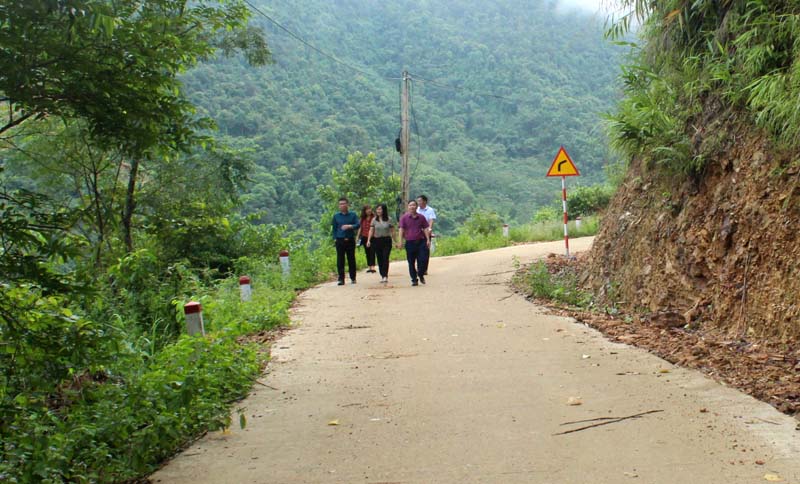
(HBO) – Da Bac district, spanning 77,976 hectares of land, has 20 communes and town covered by Programme 135 – programme for socio-economic development in specially-disadvantaged communes in ethnic minority and mountainous areas.
 Thanks to investment from Programme 135, roads in Sung
hamlet (Cao Son commune) were concretised, helping the hamlet develop
community-based tourism.
Thanks to investment from Programme 135, roads in Sung
hamlet (Cao Son commune) were concretised, helping the hamlet develop
community-based tourism.
Vice Chairwoman of the district People’s Committee Bui Thi Hieu said the
district has made poverty alleviation a key mission, which is inseparable from
the local socio-economic development strategy.
The spirit of self-reliance should be promoted among impoverished households so
as to realise the sustainable poverty reduction target, she added.
In the past time, the national target programme on sustainable poverty
reduction has served as a lever for the district’s socio-economic development.
Programme 30A, which is designed to support 64 poorest district across the
country to rapidly reduce poverty through investment in essential
infrastructure system, has given a facelift to Da Bac district. New infrastructure
facilities have been built and existing ones repaired and upgraded; poverty
alleviation models have been set up to improve and diversify local livelihoods.
Under the programme, many labourers from poor, near poor and ethnic families
have chances to work abroad.
Particularly, Programme 135 helped the district build 33 public works, maintain
52 others, support 28 production models, and open training class to transfer
science and technology in 2018.
This year, Da Bac district received 20.48 billion VND from the programme to
upgrade and build local infrastructure.
Along with the programmes, the district People’s Committee has pushed forward
with the preferential credit policy for households living under and just above
the poverty line, and those who have just escaped poverty.
The sustainable poverty reduction programmes have promoted socio-economy in Da
Bac district, resulting in the fall in the poverty and unemployment rates.
Last year, poor households accounted for 37.04 percent of the district’s total
families. The rate is projected to drop to 32 percent in 2019./.
Hoa Binh province is undergoing a dynamic transformation amid Vietnam’s national digital transition. Building on Poliburo’s Resolution No. 57-NQ/TW on breakthroughs in science, technology, innovation, and national digital transformation, the province has rolled out a wide range of practical action plans. A standout initiative is the "Digital Literacy for All” movement, an effort to ensure that no one is left behind in the digital era.
Hoa Binh province is undergoing a dynamic transformation in the wake of the national digital transformation movement. Building on Resolution No. 57-NQ/TW of the Politburo on breakthroughs in science, technology, innovation, and national digital transformation, the province has implemented a wide range of practical action plans. A standout initiative is the "Digital Literacy for All” movement ambitious effort to ensure that no one is left behind in the digital age.
With a spirit of unity and proactive problem-solving, the Party Committee, the government and the people of Dong Lai Commune (Tan Lac District) have made great strides in implementing the resolutions of the 24th Party Congress of the commune for the 2020 - 2025 term. Focusing on leadership and practical actions, the commune has brought the Party’s resolutions into daily life, creating strong impacts and pushing the local development forward.
Amid the nationwide push for digital transformation, young people in Hoa Binh Province are stepping up as dynamic pioneers, applying technology to enhance Youth Union operations and expand the reach of youth-led initiatives. Through creativity and adaptability, Youth Union organizations at all levels have introduced a series of practical solutions, contributing to modern governance and community development.
In recent years, An Nghia commune, located in Lac Son district, has stepped up administrative reform, focusing on improving the quality and efficiency of its single-window service unit for receiving and processing administrative procedures. These improvements have helped create favourable conditions for local residents and organisations to handle administrative procedures, contributing to the commune’s broader socio-economic development.
The Prime Minister-approved master plan to develop the multi-use value of forests ecosystems through 2030, with a vision to 2050, aims to improve the management and sustainable use of forest resources, create jobs, increase incomes, and improve the living standards of ethnic minorities, people in mountainous and remote areas, forest workers and those living near forests.



 Thanks to investment from Programme 135, roads in Sung
hamlet (Cao Son commune) were concretised, helping the hamlet develop
community-based tourism.
Thanks to investment from Programme 135, roads in Sung
hamlet (Cao Son commune) were concretised, helping the hamlet develop
community-based tourism.